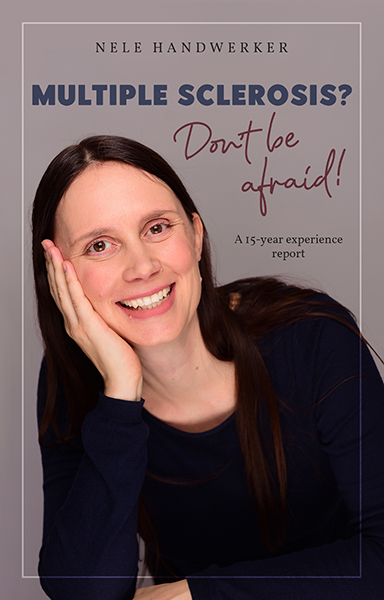Depression and mood disorders can bring your entire everyday life to a standstill. That’s why I’m dedicating this article to negative changes in the psyche. You will find out what triggers there are, when they occur, how they can manifest themselves, what support options are available and what you can do yourself. Every second person with MS experiences at least one depressive phase. It’s good if you know in advance what you can do in such a case. Because there are plenty of options. And depression is very treatable.
Klicken Sie auf den unteren Button, um den Podcast zu laden.
Table of Contents
When do mood disorders and depression occur?
Depression or phases full of negative emotions can occur right at the beginning of your diagnosis and be triggered by the diagnosis.
After all, you first have to come to terms with the fact that you have a lifelong illness with an uncertain prognosis, often as a young person.
But such phases can also occur over the years when a relapse occurs or MS symptoms get in the way of wishes and plans.
It also seems that people with MS are more prone to depression. And depression can even be the beginning of the disease, which makes diagnosis more difficult because often no MRI or other necessary examinations are carried out.
How does depression manifest itself?
Depression can have different effects and experts can clearly distinguish it from fatigue.
Some people don’t care about anything. They lose hope and become numb.
For others, the focus is on a loss of interest in family, friends, work, hobbies, society and politics.
Still others become afraid of meeting other people. This can go so far that they end up not leaving their own home. In general, anxiety and feelings of panic can be a manifestation of depression. In relation to MS, it can be the fear of soon no longer being able to work, of suffering from impaired mobility or no longer being able to fulfill your own defined role within the family.
Perhaps you also suffer from feelings of guilt along the lines of, if I had made different decisions, I would have been spared MS and could now lead a better life. Or you may devalue yourself because you believe you are less lovable to other people or less attractive for the job market.
The psychological stress can even lead to physical complaints, causing sleep disorders as well as a permanent loss of appetite.
Take action!
If you suffer from severe mood swings and are easily irritated, it can be difficult for those around you. Time to do something.
As you can see, there are many different manifestations and signs. Depression or persistent mood swings are easily treatable and often even curable. You just have to take action or accept the help that is offered to you from outside.
A typical approach is a combination of special medication to rebalance your brain’s metabolic processes and psychotherapy. ACT, acceptance and commitment therapy, is particularly suitable. As the disease itself or the progression of the disease is often a trigger for depressive phases. And don’t worry, today’s medication does not cause addiction.
By the way, euphoric changes also very rarely lead to problems. Because excessive feelings of happiness are also dangerous.
How can you measure depressive moods?
Do you find it difficult to assess whether you have dark feelings due to understandable external circumstances or whether you need help? Then start by keeping a diary. This can be handwritten with the date and a scale from 1 to 10. If 1 on your scale means very unhappy and sad and you remain in the very low range for weeks, you should seek help.
Of course, there are also apps for this.
Apps specifically for MS usually include a tracker for mood swings by default. With other apps, you can perhaps create your own categories and then fill them in.
If you want to add more details to your diary, feel free. This can be helpful if you decide to undergo treatment. But the most important thing is that you add a value for your mood to your diary every day.
And always remember, if you see a danger to yourself and your health, or in the most extreme case have suicidal thoughts, then get in touch and ask for help immediately! Your family, friends and the general emergency number, but also special emergency numbers for mental health problems are available for such issues.
What triggers lead to depression?
Before any treatment begins, the exact cause must be examined.
This includes a detailed conversation. If you have kept a diary of your mood yourself, bring it to your doctor.
Is it about processing the diagnosis (shock, repression)?
Are the effects of MS, whether physical or mental, currently an issue for you because they are affecting your private life, you tire quickly, can no longer cope with the workload or are less able to romp around with your children?
You should also take a closer look at the medication you are taking. Perhaps the depression is a side effect. Your neurologist will then check what alternatives are possible.
Some people with MS already had a mental disorder before MS, which has worsened as a result of living with the disease.
And, of course, social, genetic and organic causes should always be examined if a mental illness is new and unrelated to MS.
What can you do yourself if you suffer from depressive mood disorders?
You can help yourself with a variety of writing techniques for minor problems that don’t require an expert.
For example, there are morning pages. Immediately after getting up, sit down and write down everything that is on your mind until your mind is virtually empty. If possible, use a pen and a sheet of paper. This slows down your writing flow compared to typing on technical devices, giving you time to reflect. Write down everything, from wild and difficult-to-understand dreams to things that have been bothering you for a long time. This way, you can record anything negative, disturbing or incomprehensible first thing in the morning and capture it on paper. It allows you to get the day off to a carefree start. And often a clearly formulated problem that has been written down is much smaller than one that is allowed to go round and round in your head.
Caution: This technique is good for small hurdles and problems. A depression or anxiety disorder is a serious illness that requires professional outside help. You should not work on it alone.
Resilience
In general, it is always good to train your resilience. Resilience can help you to maintain your inner balance throughout your life or quickly find your way back to it. Be aware that the opinions of others are not always the truth. You alone determine your life, your values, your goals and how and with whom you spend your time. Mistakes or phases of weakness are completely okay and are part of a normal life. Nobody is perfect and perfection consumes a lot of energy. Instead, weigh up how well something needs to be done and whether it justifies the effort.
Remember that multiple sclerosis can reduce your performance, but you are and remain a valuable person.
As is so often the case, sport and exercise are ideal for improving your condition or reducing the risk of depression. This is because sport releases happiness hormones. Exercise in nature is at the top of the list. Go for a run, hike, bike ride or skate in nature, be it the park or really the forest, meadows and mountains.
Swimming outside is only fun for most people in the warmer months and has the added benefit of being easy on the joints. If you also manage to do your physical activity together with others, whether in the fresh air or indoors, then you’ve also done something for your social contacts.
And remember, you are the superpower in your own life. If you want to do something good for yourself, just do it.
Where can you get help?
Good first points of contact are your family doctor, your neurologist, your local MS patient organization and depression support associations.
On the website of Mental Health America you can do the worldwide recognized 10 question depression test. The New Zealand depression website also offers another test on anxiety disorders to find out what your problem is. These are just two examples. Feel free to use another local service to find out if you need help or if this is not/not yet the case. If in doubt, ask for help rather than putting off the problem for too long.
If the self-test confirms that you have depression, contact your neurologist, GP, psychiatrist or psychosomatic specialist as soon as possible.
If it is more of a temporary low, you may be able to make use of the counselling services offered by your local MS organization. The staff can often also help you find specific support, such as a neurologist or psychiatrist nearby.
Involve your family and friends. They should know how you are feeling. Perhaps talking about it and the tears that flow will already help you. And if not, you are no longer carrying the burden alone. In any case, it is not good to stay in a low for long. You can either get out of it on your own or get professional support from outside. And the sooner you seek help, the better your chances of being cured and preventing the depression or anxiety disorder from becoming chronic.
How can psychotherapy help you?
Psychotherapy encompasses many different techniques. Behavioral therapy and depth psychology therapy are relatively common. But these are just two forms.
Generally speaking, the aim is for you to talk about your problems, worries and fears and for the psychologist or psychiatrist to help you classify them. Is something you are experiencing really normal or not? What other approaches or ways are there to solve a problem? Psychologists can also help you deal with trauma. They offer you help to help yourself. Nothing happens without your cooperation.
To successfully participate in psychotherapy, you must be willing to open up. The chemistry with your therapist must be right. It therefore makes sense to start with introductory sessions. Because if something is stopping you from opening up, the whole therapy won’t help. Then it’s better to search a little longer until you’ve found the right therapist for you. Whether psychotherapy is a private service, partially or fully paid for, depends on your local circumstances, the health system and your health insurance.
What medication is available to treat depression?
Traditionally, antidepressants are used if psychotherapy alone is not sufficient. In general, however, person-centered psychotherapy should form the basis of treatment and be supplemented with medication if necessary, according to the recommendation.
Incidentally, the new generation of antidepressants, selective serotonin reuptake inhibitors (SSRIs), have fewer side effects with the same potency.
In any case, your doctor is the expert here.
What is the best prevention against depression?
No one is to blame for an illness. And depression is an illness. Nevertheless, there are risk factors and you can take preventative action.
Exercise regularly and a lot, preferably outdoors. The WHO recommends at least 150 minutes of moderate exercise per week; if you exercise at high intensity, a shorter total duration is sufficient. This will replenish your vitamin D stores and supply your whole body with sufficient oxygen and happiness hormones.
Eat healthily.
Avoid excessive alcohol consumption and other intoxicants.
Maintain your contacts, be it through personal meetings, phone calls, within a forum or a social media platform.
Make time for your hobbies. Because you can also draw positive energy from them.
Listen carefully to your loved ones and try to understand their feelings instead of offering solutions. Of course, this should be reciprocal. After all, if we feel understood and the other person also empathizes or at least tries to empathize with the situation, a lot has already been achieved.
Food for thought
If current political events are really bothering you, then it’s better to only consume a serious news service once or twice a day at a fixed time.
Research how you can help and lend a hand. This will give you a sense of self-efficacy instead of helplessness.
And keep a happiness diary. Before you go to bed at night, write down three things in your happiness diary that have made you happy today. This will help you end your day with positive thoughts and increase your chances of having pleasant dreams.
You will also remain aware of all the beauty in this world and the little joys that everyone experiences every day – be it a flower, a child’s laughter or a particularly beautiful cloud in the sky.
Question to you
Have you ever thought about psychotherapy or even undergone one?
See you soon and try to make the best out of your life,
Nele
For more information and positive thoughts, subscribe to my newsletter for free.
Click here for an overview of all podcast episodes published so far.

And at many more places.
* This text contains affiliate links. This means that I get a small compensation if you buy the product recommended by me through the link. For you nothing changes in the price of the product. And it helps me to pay for the blog and to write new posts.










